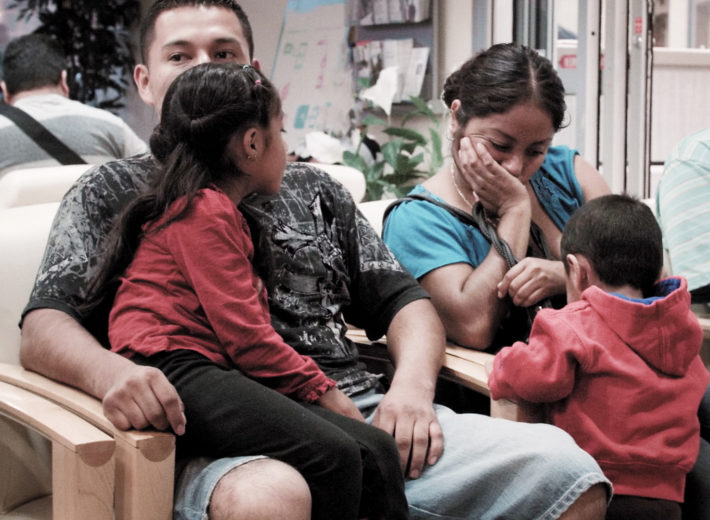It is one thing to type away at your keyboard expressing your opinions across the Internet on the ills (or benefits) that undocumented immigrants bring to the United States, but it is another thing to put a human face – or, even a name – to these individuals and their struggles. Clínica de Migrantes, a documentary recently released by HBO, brings you the stories of undocumented immigrants who, left with little to no healthcare options, seek out help in a Philadelphia-based clinic staffed with a group of noble medical professionals who take on the massive responsibility of caring for this disenfranchised community.
Dr. Steven Larson, executive director and co-founder of Puentes de Salud, located at 1700 South Street in Philadelphia, Pa., told ‘LLERO that the work he does today with this community was his initial reasoning for pursuing a career in medicine.
“I just had this sense that [medicine] was about working with the community, working with people, and trying to make them healthy and well,” Dr. Larson said. “Mid-way through my medical education I took a year off and traveled and did some work with the Indian Health Service. Exploring new communities and figuring out solutions became a challenge, and it just captured my curiosity and filled my need to do something,” he added.
It was this work that prepared Dr. Larson and Puentes de Salud co-founder, Dr. Jack Ludmir, for the challenge of starting a fully functional clinic to care for the undocumented population of Philadelphia.
“I tell all of the people that I’ve worked with over the years that nothing in this world is free – light switches turning on lights, running water, physical space, staff to supply a clinic in terms of clerks and office managers, nurses, nurse practitioners – it all requires, at a certain point to be really effective, a certain core of individuals that are salaried and full-time,” Dr. Larson explained, adding, “Now, it’s about going after that funding, because we don’t take federal dollars nor do we take state dollars. We reach out to concerned individuals and compassionate community members, and people who have skills or resources or both.”
Fortunately, Puentes de Salud attracts dozens of volunteers, some of whom are med students, who, aside from looking for internships to further their budding careers, also simply want to help this community. Dr. Daphne Owen began as a medical intern at Puentes de Salud, and later decided to stay on as a staffer after becoming a doctor.
“I first got involved [with Puentes de Salud] when I first moved to Philadelphia from California. I, actually, studied Sociology in college, and I moved to Philadelphia to get things together to apply to medical school,” Dr. Owen told ‘LLERO. “I really wanted to incorporate ideas about social determinants of health into my thinking about medicine, and I heard about Puentes de Salud, and I was really interested and got involved.”
Read on to see how the work of Puentes de Salud inspired the documentary.
The dedication and determination of the Puentes de Salud staff caught the attention of film producer Sara Bernstein, who suggested to Clínica de Migrantes director, Maxim Pozdorovkin, to visit the clinic in hopes of filming the work being done at the clinic.
“I went down there to see the work that they were doing, and I was so humbled and inspired by the work,” Pozdorovkin told ‘LLERO.
“It sounded like this David and Goliath story where this place was really going against the national immigration trend, as well as the trend in healthcare and corporate medicine. They were building something from the ground up, integrating the local community, and doing everything that needed to be done at the time—and not waiting for big forces to step in.”
Filming at the clinic for over a year, Pozdorovkin gives the world a front row seat to the experiences undocumented immigrants go through when they seek out medical care, which is something that was an eye-opener to the director himself.
“I think that there are so many things about the sort of medical issues that I didn’t realize. I didn’t understand that undocumented immigrants can’t buy health insurance even if they wanted to. I, like many other people, believed that undocumented immigrants could just go to any emergency room and get treated, and I realized that that’s far from the case, and it’s much more complicated,” Pozdorovkin stated, adding, “I realized to what extent in which this population really falls through the cracks, and I really couldn’t even have imagined it because I didn’t think about it. But, once you’re there and you’re seeing the people, you have a real realization.”
And, it is this sort of realization that those involved with the film hope will also reach the audience.
“Bringing up the issue for public conversation I think is important. I still come across a lot of people that think that undocumented immigrants take welfare, that they take all of these benefits, but they can’t access those benefits and they don’t. I think getting some of the real facts out there is important,” Dr. Owen said. “Additionally, I hope [Clínica de Migrantes] brings up the issue that in so many ways, immigrants, both documented and undocumented, are intertwined with all of our lives in the United States no matter where you live.”
As for Dr. Larson, his hopes for Clínica de Migrantes is that the film will get those who hold anti-immigrant sentiments to rethink their views and beliefs about this population.
“This is an opportunity to present a counter argument to all of the anti-immigrant individuals that are out there. Put a human face to this, and let people understand that there’s an opposite side to this discussion that has a long term impact on our nation and our communities,” Dr. Larson says. “Even if you can sway a small percentage of people, then the scales will tip in your favor.”


